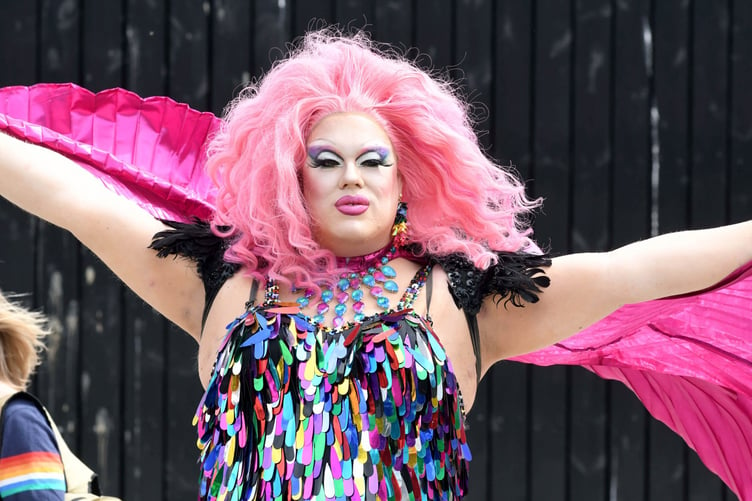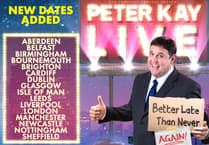The month of June is marked the world over as Pride month, a period dedicated to the celebration and commemoration of lesbian, gay, bisexual, transgender and queer (LGBTQ+) pride. This time, Siobhán Fletcher examines the question: do we still need pride?
Last time, we discussed last year’s Isle of Pride event and heard a little about why you won’t see another one – at least on the same scale and staged in the Villa Marina gardens – this year.
Although, it is worth noting a more scaled down event (not organised by the former charity) has been announced for this summer, with the festivities taking place at Mad Jack’s on Saturday, July 15.
This time, we’re going to stop looking back at the past, and turn our focus to the future.
From the outside, it may seem that there’s never been a better time to be part of the LGBTQ+ community. And on a surface level, you would be forgiven for thinking that.
This year’s London fireworks on New Year’s Eve featured an ode to London Pride for its 50th anniversary, and specifically named the pioneers in the Gay Liberation Front, who we touched on at the start of this series.
We can watch the art of drag in a primetime spot on the BBC – now that RuPaul has hopped onto our TV screens on this side of the pond with the smash-hit RuPaul’s Drag Race.
Same-sex marriage was legalised here in the Isle of Man in 2016 and men who have sex with other men can now donate blood – an omission which was challenged at last year’s Isle of Pride event by Manx actor Joe Locke.
And most major cities in the UK host a pride event, year in year out.
The world is a very different place than it was 50 years ago; or 100 years ago, or even 10 years ago. But that’s not to say there is equality for all, everywhere.
This year alone, politicians in Uganda cheered as they passed a new bill making it illegal to identity as LGBT. It was already a crime to be gay in Uganda, with adults found to have had same-sex relationships facing seven years in prison.
But the new law, according to Amnesty International, ‘builds on existing laws and goes even further to criminalise LGBT individuals – lengthening sentences for adults found ‘guilty’ of same-sex relationships, and extending punishments to people involved in ‘promoting’ homosexuality. Under the Anti-Homosexual Bill, anyone found guilty of same-sex relations would automatically be sentenced to a lifetime behind bars’.
Anti-drag laws are sweeping across the United States, and in the UK, the Baroness Casey review – commissioned in the wake of the murder of Sarah Everard in 2021 by serving firearms officer Wayne Couzens – found the Metropolitan Police to be institutionally racist, sexist and homophobic.
Last year’s men’s World Cup in Qatar was also under the spotlight in the worldwide media, given its anti-gay laws.
At the time of writing, simply being gay is illegal in 67 countries around the world – almost half of which are Commonwealth jurisdictions.
It’s punishable by death in 11.
Given this context, throughout this series, I asked all of my interviewees the simple question, ‘Do we still need pride?’
The resounding answer was yes.
Former Manx Bard Owen Atkinson may also be found performing as drag queen Fenella Beach. They told me it’s absolutely vital in places such as the Isle of Man.
They said: ‘We absolutely need Pride. As long as queer people don’t feel safe on the streets, as long as queer kids don’t feel safe coming out to their parents, we still need pride.
‘You know, I am visibly queer. I get street harassment all the time in and out of drag. I think that’s proof that Pride is needed and I think most of my friends feel the same.
‘I think if we can shift the focus towards protest, towards community activism… you can have the fun, and you can have the celebration. You can have the big stage with all the artists and everything, as long as you kind of have that reminder of what it’s all about.
‘I think that kind of grassroots organisation, is hopefully what we’re seeing for 2024, which is very exciting. I think that now that we’ve seen that it can be successful, it can be reorganised and restructured and refocused. Which is really exciting.’
The island’s first singing drag queen, Vida La Fierce, agreed, citing instances of queer rights being revoked around the world.
She said: ‘Anyone who can’t see a reason for Pride is ironically the reason for it. If you’ve never had to actually fight for equality and fight for your rights, then that is something that is really worth celebrating.
‘Huge progress has been made, but there’s still a long way to go. There are still injustices happening on our own doorstep, but also further afield as well. There are so many countries in the world with anti-LGBTQ+ laws, and there are so many that are in the process of making more of them.
‘Some countries seem to be taking backwards steps. You can see what’s going on in some states in America at the moment, and that is terrifying. Anyone sitting watching a situation where a country is going backwards in human rights should be terrified, because if you think it’s just the gays or the trans people they’re coming for – think again.
‘They’ll be the first. But then what’s to stop them coming for someone else’s rights next and someone else’s after that? And if you think it can’t happen, you know it can. All it takes is the wrong people in power, and a swish of a pen, and rights can be taken away.’
She added: ‘No rights are guaranteed forever. So even though we’ve won some, they’re not enshrined forever. The wrong person can come across and wipe them out.
‘That should be terrifying to everybody, because an attack on any groups human rights, is an attack on all of our human rights.
‘The fact that some countries are taking back with steps should scare everybody, because it could be you next.’
This is an extract from the fifth and final instalment of a series of special programmes looking at the history of Pride.
To hear more, tune into the next episode of ‘A Brief History of…Pride’ on Manx Radio tonight (Tuesday, July 4) at 6pm.




